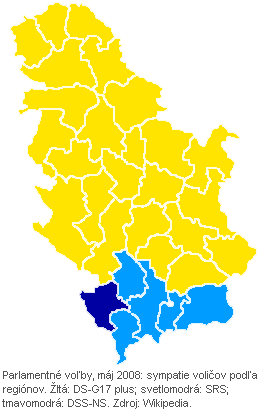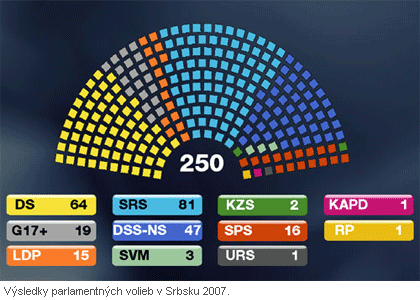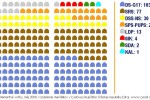Not even the constitutive session of Serbian Skupština on 11th June, 2008, has given an answer to the question how the future ruling coalition will look like. Official as well as unofficial coalition talks, which have been lasting for more than a month, hasn’t born any concrete results yet. It seems that Serbia has been facing the same dilemma like in 2000 when the political battle was under way between the retiring President Slobodan Milošević and his democratic challenger Vojislav Koštunica.
Also nowadays Serbia has been facing the dilemma of carrying on democratic development or returning to authoritarian and intolerant nationalism which is symbolised particularly by Serbian Radical Party (SRS) through its rhetoric. Conflict lines within the Serbian society pertain again to foreign political orientation and the choice between pro-western orientation with EU membership prospect and international isolation mitigated by unclear and primarily unreal promises of Russia concerning possible support of Serbia on the international scene. Last but not least, it’s a conflict between the vision of return to the era of the 1990’s and the future.
Key in the hands of socialists
There is a change of participants in contrast to the year 2000. Main protagonists have exchanged their roles with those who belonged to second-rate players eight years ago. Simultaneously, the parliamentary elections held in May 2008 meant the return of the Socialist Party of Serbia (SPS), which was given the opportunity of participate in the constitution of the new government after a long period of time. Paradoxically, it was the long-time marginalised SPS which became the symbol of internal division of the whole Serbian society. The future development of the country depends on the decision made by this party which, as the successor bloc to the League of Communists of Serbia, contributed significantly to the unleashing of nationalist wars in the former Yugoslavia as well as to the consolidation of authoritarian regime in Serbia.
The development is symbolised by two alternatives: The first one is the formation of a coalition with the bloc For a European Serbia (ZES) which unites the Democratic Party of Serbia and further liberal and leftist groupings (G17 and Serbian Renewal Movement). The second one is the constitution of a government along with SRS and the coalition of national parties, namely the Democratic Party of Serbia (DSS) and New Serbia (NS) headed by Vojislav Koštunica.
SPS has gone through a radical development. Instead of post-communist nationalism close to extreme right represented by SRS, it fell to social democratic values. This “tacit transformation”, which was under way in long political isolation without the possibility of influencing actively the governmental policy in the case of SPS, gave the party the opportunity of realising Serbian “historical compromise” which would be represented by the entry into pro‑European coalition in this case. Although the SPS history is linked rather with radicals, sociodemocratic program, the support of EU membership and interest in international party structures integration speak in favour of European coalition. In the 1990’s, Serbian socialists attempted the membership of Socialist International (SI). However, they were rejected due to the policy of Milošević’s regime. In that period, they could only count on the support of French socialists and Greek Panhellenic Socialist Movement (1). Nowadays, Hannes Swoboda, the Vice-Chair of the Party of European Socialist (PES), has been opening the door to them (2). The precondition of the associated membership of PES is the membership of Socialist International. European social democrats demand at the same time from Serbian socialists not only the support of Stabilisation and Association Agreement with the EU but also the cooperation with the International Criminal Tribunal for the former Yugoslavia (ICTY) in the Hague. The fulfilment of the first criterion doesn’t pose any fundamental problem for the socialists and it is the attitude of Koštunica’s DSS to European integration which caused that the socialists’ national coalition accession talks have been deadlocked. The socialists consider Serbian EU membership an inevitable precondition for the conduction of their social field program. The DS leader, President Boris Tadić, accommodates them pushing through the origin of a “socially responsible” government headed by the democrats (3). The second criterion is much bigger problem since the socialists request the suspension of the criminal prosecution of family relatives of their late leader Milošević as well as the former director of state television Dragoljub Milanović (4).
Although the verdict of acquittal in favour of Milosević’s son Mark dated 10th June may bring the socialists and democrats headed by the current President Boris Tadić closer, it stirs up indignation among other partners united in ZES, namely Serbian Renewal Movement (5). In the pre-election period, the collaboration with the socialists was ruled out also by Čedomir Jovanović’s Liberal Democratic Party (LDP). Today, even the Chairman of this party’s political council, former dissident Vesna Pešić doesn’t have any objections against backing the ZES – SPS coalition government (6). The representatives of ethnic minorities are further perspective partners of the pro-European coalition.

However, coalition talks are under way also with the representatives of nationally orientated parties. Although socialist deputies sat next to ZES deputies at the constitutional session of the Parliament (7), previous negotiations with DSS and SRS brought a concrete result in the form of the support of Serbian radicals’ nominee Aleksandr Vučić as the mayor of Beograd (8). Similar local level coalitions have been established also in other towns sparking indignation among potential SPS partners united in Tadić’s bloc (9). DS tries to hamper the formation process of joint coalition of the socialists and nationalists by means of obstructions, like the decision on the summoning of Beograde municipality not earlier than 14th July (10). By that time the future ruling coalition must be decided on.
Coalition friction areas
There are several grounds for socialists’ post-election tactic manoeuvres. The first one is the effort to make the best of the situation as this is their first chance to participate actively in state power after eight years. Concurrently, it’s impossible not to see the internal insecurity because in contrast to the pro-European leadership of the party headed by SPS Chairman Ivica Dačić, a considerable part of the membership and lower level functionaries is much closer to radicals. Moreover, Serbian socialists have to count on the opinion of two smaller left parties, namely the Party of United Pensioners of Serbia (PUPS) and United Serbia (JS), which speak up for the formation of pro-European coalition. Thus Serbian socialist have been choosing between joining other post-communist parties in the former Soviet bloc which have upheld democratisation processes as well as the European integration of their and returning to own past. Tendencies appearing in their policy are inconsistent from the long-term point of view. There is a threat of dissension in both of the cases. Furthermore, in terms of the pro-European coalition a tense relation between the socialists and the smaller liberal party G17 Plus and Jovanović’s liberal democrats will be equal to a destabilisation factor since for them the participation of socialists will represent a compromise with own principles. In view of the character of its membership and electorate, in the future coalition government with the democrats, SPS may play similar role as Kuštunica’s DSS used to play in the previous government.
Nevertheless, SPS is not the only party to face internal dilemmas. Also DSS is in the grip of internal tension. Although Koštunica was given a pledge of repeated nomination as the Prime Minister from the radicals, the party cannot ignore the fact that it suffered election defeat losing almost a third of votes in comparison to the 16.55 per cent result in 2007 and has solely thirty seats in the new parliament (11.59 per cent). Owing to the coming together of DSS and the radicals, the influence of the “hard line” around Slobodan Samardžić and Zoran Leončar has been growing. Nonetheless, several regional DSS representatives are dissatisfied with this development. The most influential opponent of this wing pushing through the collaboration with SRS was the party’s Vice-Chair Aleksandr Popović who was also the candidate of DSS and New Serbia (NS) for the post of the Mayor of Beograd. Nowadays, Koštunica has been concentrating on the effort to maintain the post of Prime Minister at all costs. He has been allegedly weighing up the retirement from politics in the case of failure (11). The tension between the radicals and DSS, the representatives of which have been still fulfilling the duties of government members, was sparked by the arrest of the former Security Services Chief in Republika Srbska in Bosnia Stojan Župljanin on 11th June, 2008. In view of the socialists’ unpredictability, Tadić’s DS keeps on attempting to win the favour of DSS. However, it demands the return to pro-European course from it (12).
Apart from the threat of international isolation, Serbian innerpolitical destabilisation particularly in connection with the results of Vojvodina autonomous parliament regional elections, in which the radicals as well as their allies were defeated (DS acquired the absolute majority of 64 mandates in 120 member house), poses another threat for the possible coalition of radicals, nationalists (DSS-NS) and SPS-PUPS-JS (13). Although no open separatist tendencies appear in Vojvodina and the elections accounted for the enfeeblement of Hungarian Coalition positions, the formation of nationalist coalition on central level would indisputably lead to a conflict with Vojvodina autonomous structures.

Bosnia factor
Pro-European candidates were backed by the representatives of Bosnian Serbs in January – February 2008 presidential elections as well as in parliamentary elections. The Prime Minister of Republika Srpska Milorad Dodik has expressed himself clearly prior to the second round of presidential elections that the victory of the radicals’ candidate Tomislav Nikolić would be a mishap to Serbia. According to him “There is no time left for Serbia to conduct experiments” (14). During the election campaign before parliamentary elections, he stood by Boris Tadić’s side emphasising that it is in Bosnian Serbs’ interest to join the EU along with the citizens of Serbia (15). Serbia has invested considerable financial means in the economy of this entity of Bosnia and Herzegovina. A different pace of the integration of Serbia and Bosnia and Herzegovina into the EU would thus mean a disruption of bilateral economic relations, which are important for both countries that are in quest for the restoration and modernisation of their economies as well as the restriction of contact possibilities among the members of Serbian ethnic minority on both banks of the river Drina. The victory of the radicals in Serbia would mean the worsening of Bosnian Serbs’ positions in Bosnia and Herzegovina, which is controlled by the international community. Although Dodik rejects Kosovo’s independence and speaks up for its reintegration with Serbia, he realises that the success of the radicals would worsen the position of Serbia and Kosovo Serbs in this region.
Conclusion
Frequent speculations in Serbian media attest to the complicated character of the process of new ruling coalition birth. The representatives of political parties and blocs are very restrained. Thus, for instance, the Beograd daily Politika has already released the supposed composition of future ZES and SPS government (16), although the political leaders of big parties deny any negotiations (17). The new government has to be constituted by the end of July. If not, Serbia will be heading for the repetition of parliamentary elections. These could amount to a disaster for smaller parties when considering the current polarisation of Serbian society. Even if they succeed in forming parliamentary majority and creating a new coalition, it won’t mean that the new government will remain in the same composition for the whole term of office. Serbian society remains divided and the establishment of independent Kosovo yet prior to the signing of the Stabilisation and Association Agreement with the EU has just deepened this polarisation. Nevertheless, dividing lines present since the end of the 1990’s and the beginning of the 21st century are modified by the changed interests of several political players. That’s why no political bloc will be able to meet its objectives without considering the opinion of the other half of the society.
Owing to public opinion as well as the opinion of the socialists, pro-European coalition won’t be able to give up the demand to revise the stance of the West on the question of Kosovo recognition and they won’t be able to carry out a definite break-up with the era of 1990’s, in terms of cooperation with Hague Tribunal in particular. This will be a problem predominantly for LDS. Nonetheless, the nationalist won’t be allowed to ignore the international factor too. The alliance with Russia seems rather problematic. Russia has managed to assume control over Serbian power engineering. Though Russian investors may carry on profiting from Serbian privatisation, the US and EU member states are capable of guaranteeing the flood of new investments as well. Russian-Serbian cooperation in security region seems to be yet less perspective due to the fact that the majority of Serbian neighbours pursue NATO membership, or rather, they are about to enter it. Russia could count on the possibility of a closer military collaboration with Serbia only in the case of Montenegro changing its foreign political course. That’s also the reason why a conflict with the EU is not in Serbia’s long-term interest.
Notes:
1) Socialist Party of Serbia. Free Serbia Politics, 13th August, 1999. http://www.xs4all.nl/~freeserb/politics/e-sps.html
2) Hanes Svoboda, potpredsednik socijalista u EP. SPS može uslovnou evropske socijaliste. Danas, 28th May, 2008.
3) Tadić za socijalno odgovornu vladu. B92.net, 28th May, 2008.
4) Mrkonjić: Osloboditi Milanovića. B92.net, 28th May, 2008.
5) Saradnja s Hagom ne ometa pregovore o vladi. Politika, 12th June, 2008.
6) “LDP će podržati vladu ZES-SPS”. B92.net, 10th June, 2008.
7) Konstituisana Skupština Srbije. B92.net, 11th June, 2008.
8) Beograd se vraća u devedesete. Danas, 28th May, 2008.
9) G17 plus: Nema kompromisa. B92.net, 28th, May 2008.
10) Vučić najavio veliki protest. B92.net, 8th June, 2008.
11) Koštunica razmišlja da se povuče iz politike. Blic, 25th May, 2008.
12) Tadić za socijalno odgovornu vladu. B92.net, 28th May, 2008.
13) Demokratama apsolutna vlast u Vojvodini. Politika, 28th May, 2008.
14) „Pobeda Nikolića pogubna za Srbiju.” B92.net, 31st January, 2008.
15) Tadić i Dodik otvorili Park RS u Beogradu. Tanjug, 5th May, 2008.
16) Saradnja s Hagom ne ometa pregovore o vladi. Politika, 12th July, 2008.
17) Socijalisti i dalje bez odluke s kim će u vladu. Danas, 11th June, 2008.

